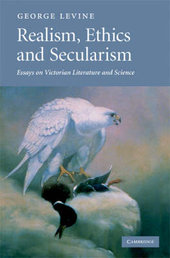
|
Realism, Ethics and Secularism: Essays on Victorian Literature and Science
Hardback
Main Details
| Title |
Realism, Ethics and Secularism: Essays on Victorian Literature and Science
|
| Authors and Contributors |
By (author) George Levine
|
| Physical Properties |
| Format:Hardback | | Pages:294 | | Dimensions(mm): Height 235,Width 158 |
|
| Category/Genre | Literary studies - c 1800 to c 1900 |
|---|
| ISBN/Barcode |
9780521885263
|
| Classifications | Dewey:820.9356 |
|---|
| Audience | | Professional & Vocational | |
|---|
|
Publishing Details |
| Publisher |
Cambridge University Press
|
| Imprint |
Cambridge University Press
|
| Publication Date |
9 October 2008 |
| Publication Country |
United Kingdom
|
Description
George Levine is one of the world's leading scholars of Victorian literature and culture. This collection of his essays develops the key themes of his work: the intersection of nineteenth-century British literature, culture and science and the relation of knowledge and truth to ethics. The essays offer perspectives on George Eliot, Thackeray, the Positivists, and the Scientific Naturalists, and reassess the complex relationship between Ruskin and Darwin. In readings of Lawrence and Coetzee, Levine addresses Victorian and modern efforts to push beyond the limits of realist art by testing its aesthetic and epistemological limits in engagement with the self and the other. Some of Levine's most important contributions to the field are reprinted, in revised and updated form, alongside previously unpublished material. Together, these essays cohere into an exploration both of Victorian literature and culture and of ethical, epistemological, and aesthetic problems fundamental to our own times.
Author Biography
George Levine is Professor Emeritus at Rutgers University and Visiting Scholar in Residence at New York University.
ReviewsReview of the hardback: 'In Realism, Ethics and Secularism, George Levine reaffirms once again his position as one of the most thoughtful and relevant critics working on literature and science over the last thirty years ... Levine moves effortlessly among the full range of Victorian fiction and non-fiction, even as he responds, always courteously and judiciously, to the arguments of contemporary literary critics, philosophers, scientists and historians ... It is hard to imagine a better introduction to scholarship in literature and science today and to its wider significance ... a major contribution to our understanding of Victorian culture and realist fiction ... it is a model of literary criticism itself. On all of these grounds, it deserves to be read widely and deeply.' John Holmes, University of Reading
|